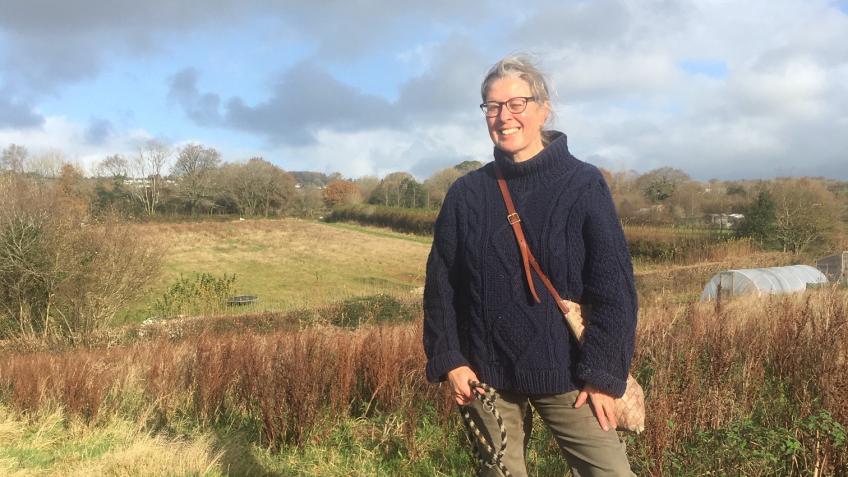For the last 10 years I have run printed textile business, Thorody. We hand print our designs onto high quality linen for interiors. Flax for linen is no longer grown commercially in the UK and at Thorody we buy most of our linen from Belgium where the flax is grown within 20 miles of the mill.
We have a lot of experience of the linen market as customers and know that there is a market for UK grown flax. We believe Britain could have its own flax industry again.


Our aim is to grow 1 acre of flax as a precursor to establishing a more substantial commercial flax growing social enterprise that is environmentally responsible. Initially the amounts of flax fibre from 1 acre would be suitable for hand processing and weaving. Eventually we aim to develop an integrated ‘grow, process, spin, weave and sell’ social enterprise involving local small farmers and creative enterprises in Plymouth and Cornwall linking the city to the surrounding countryside and vice versa and providing sustainable and longterm employment and training opportunities in the these areas.
- Flax thrives in British soil, the whole plant can be used for a variety of purposes and there is a market for both the linen and the flax plant bi-products and chaff
- France and Belgium both have successful flax and linen industries and very high environmental standards
- Flax is grown along the western seaboard of these countries right opposite the south coast of the UK and the soil and conditions are very similar
- Flax requires no irrigation, only rainwater
- Flax requires little or no pesticides or artificial fertilisers
- Flax is a carbon sink – in Europe it captures 250,000 tonnes of C02 per year
- Flax is the strongest of all the vegetable fibres and gets softer and stronger the more it is handled
- Flax growing and processing provides 12,000 jobs in Europe
- Linen can absorb up to 20% of its own weight in moisture. It is breathable, releases moisture quickly and has excellent thermoregulation qualities
- Linen is virtually lint free, non-static, non-allergenic, naturally insect-repellent and gives UV protection
- Flax was grown in the UK for many centuries, at least from1086 (Domesday Book)
The project will be lead by me with assistance from my partner, Theo Sykes. We are pleased to have farming advice and guidance from Tamar Grow Local and flax experts Simon and Ann Cooper as well as family members who are farmers. We also have guidance from Roger Pipe of Millfields Trust and Sophie Glover of Makers HQ, in Plymouth, on employment, training and social enterprise.
This fundraising is about the first stage, which will be to grow one acre of flax, harvest and process the fibre. This year, in November, we took possession of the acre and we now have to prepare the plot for planting flax next April. This is the acre...

There is a lot of work to do to prepare the land and we will grow a cover crop to improve the soil. We intend to use a small section of the plot to explore ways of using regenerative farming methods and permaculture ideas on a flax crop. We will use coventional methods for the larger remaining part of the acre. For this first stage we are fundraising for the following:
- rent and insurance for the acre
- the hiring of farming machinery for working the land
- the seed for both flax and cover crop (we intend to purchase seed for two years as there will be extra costs after Jan 2021)
- the purchase of machinery and materials for processing the fibre, this is in the stretch budget.
In November/December 2020 the ground will be prepared and a cover crop planted.
In April 2021 the flaxseed will be sown. We will need to weed regularly until the flax has established itself.
100 days later, in July 2021, the flax will be pulled up and laid in the field to ret. Dew retting is the most sustainable method. The flax plants are pulled up by their roots, left out in the field for 6 weeks and acted upon by the dew, sun and fungi. Retting breaks down the pectins surrounding the fibres allowing them to be separated. No extra water is required, unlike other methods. Currently dew retting is the most popular and sustainable method.
The stretch target, if reached, will be used for the purchase of hand processing equipment. Hand processing involves, breaking the fibre, scutching which is the separation of the usable fibres from the woody stem and hackling the fibers which is combing them into long hanks ready for spinning..


The first stage is very much a learning exercise and we do not want to pre-empt what we might learn. That said, we do have plans for the second stage. In Spring 2021 we will do a second fundraiser. We will be fundraising for the premises, spinning and weaving part of the process. Spinning and weaving will take place in the winter of 2021. At stage 2 we will be ready to set up as a social enterprise and set up a processing unit in Plymouth which will provide employment for local people. We will also be looking to extend our acreage and grow more flax. Other considerations will be to undertake research and developement in order to mechanise some of the processes in an environmentally friendly way.
The ultimate aim is to reintroduce commercial flax and high quality linen production to South West UK, find innovative solutions to the problem of pollution and environmental damage and provide jobs for the local economy, linking rural areas with towns in Cornwall and the city of Plymouth.
We are offering a range of Thorody face masks, hand block printed and screen-printed travel pouches and cushions as rewards. We will be adding other rewards during the crowdfunder as well as opportunities to get involved physically with growing flax.

Masks - our masks are made from 2 layers of Thorody linen union, they have a pocket to insert more filter layers or some lavender. They also have nose wires to help keep them in place and adjustable ear straps. Colours may vary slightly from those shown.
Yellow mask

Blue Mask

Pink Mask

Green Mask

Jonquil Mask

Zero Waste Linen wraps these linen pouches are made from hand-printed high quality linen off-cuts. They are very useful for storing phone chargers or other bits and bobs, in fact they are very useful for storing face masks. There may be slight variations in the block-printing.
Block-print 1


Block-print 2


Block-print 3


Block Print 4

Screen-print 1

Screen-print 2

Screen-print 3

Lockdown cushions
Cushion 1 - Chainlink, Hand block-printed linen cushion, 60 cm x 40 cm

Cushion 2 - Birds, Hand block-printed linen cushion, 60 cm x 40 cm

Cushion 3 - Ivor Yellow, hand screen-printed linen cushion, 30cm x 50cm

Cushion 4 - Ivor Blue, hand screen-printed linen cushion, 30cm x 50cm

Cushion 5 - Ivor Orange, hand screen-printed linen cushion, 30cm x 50cm

Cushion 6 - Hoof 30cm x 50cm dark blue on flax linen

Cushion 7 - Hoof 50cm x 50cm dark blue on ivory linen

Cushion 8 - Hoof 50cm x 50cm pink on flax linen

Cushion 9 - Brockley Cross 30cm x 50cm orange on natural linen
Brockley Cross 30cm x 50cm orange on natural linen
Cushion 10 Brockley Cross 50cm x 50cm orange on natural linen

These rewards make great gifts, are both useful and beautiful and you'll be helping to support an exciting heritage and community project.
I will be adding more rewards and updates from the plot over the coming weeks.
Thank you for reading.

